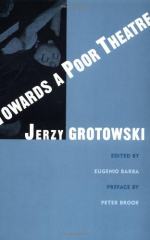|
This section contains 470 words (approx. 2 pages at 400 words per page) |

|
Towards a Poor Theatre Summary & Study Guide Description
Towards a Poor Theatre Summary & Study Guide includes comprehensive information and analysis to help you understand the book. This study guide contains the following sections:
This detailed literature summary also contains Topics for Discussion and a Free Quiz on Towards a Poor Theatre by Jerzy Grotowski.
Towards a Poor Theatre is a collection of essays, interviews, and instructions for actors developed chiefly by Jerzy Grotowski and his Polish Theatre Laboratory, which Grotowski established to further the theory and practice of acting.
Grotowski begins by wondering what separates the theatre from its chief rivals, film and television. He finds that the essential unique element of theatre is contact with the "living organism" - the actor. Since theatre can never be as visually rich and lavishly designed and lit as film or television, let theatre be impoverished in these aspects, such that the focus on the actor is that much greater. In this regard, Grotowski criticizes contemporary productions, "rich theatre," that attempt to emulate film and television with complex lighting, gimmicky contraptions, large set pieces and scenery, etc.
Grotowski's "poor theatre" has several consequences. Such things as lighting, makeup, costume, props, and scenery are minimized or eliminated entirely. In order to break down the barrier between spectator and actor, the entire theatre is made to be the stage, with actors interspersed with spectators throughout the space.
The ideal actor in this system is termed the holy actor, who is able to commit himself fully to the enterprise, to the point of sacrificing himself utterly in the aim of stripping away the mask of lies imposed upon all of us by civilization. He enters a trance state, wherein outer reaction is indistinguishable from inner reaction. The aim of theatre, then, is a therapeutic attempt to reveal the truth and cause a self-revelatory catharsis in the spectator such as the actor himself experiences.
In contrast to other theoreticians like Artaud and Brecht, Grotowski supplies a method along with his theory and aesthetic approach, in the form of a long series of exercises for the actor. These exercises, which include breathing, conceptual experiments (the actor may pretend he is a tree growing), non-vocalizations, physical contortions, and yoga-like poses, aim to strip the actor of any inhibitions, resistances, or barriers the actor has set up psychically or biologically. In this way, Grotowski's method is what he calls a "Via Negativa," a negative way, based not upon the accumulation of techniques and "tricks," but of the actor shedding blocks.
Many pieces of advice are also given to the actor. The text is seen as secondary. Acting is a series of beats, a dynamic give and take plotted through what Grotowski calls a "score," borrowing from music. The actor should not act for motives like fame or fortune, for these are barriers to true art. Above all, the actor must have the courage and discipline to give his all to the stage, for only in total "self-donation" will the actor have the power to strip away the mask of lies of everyday life to discover and share the truth underneath.
Read more from the Study Guide
|
This section contains 470 words (approx. 2 pages at 400 words per page) |

|



